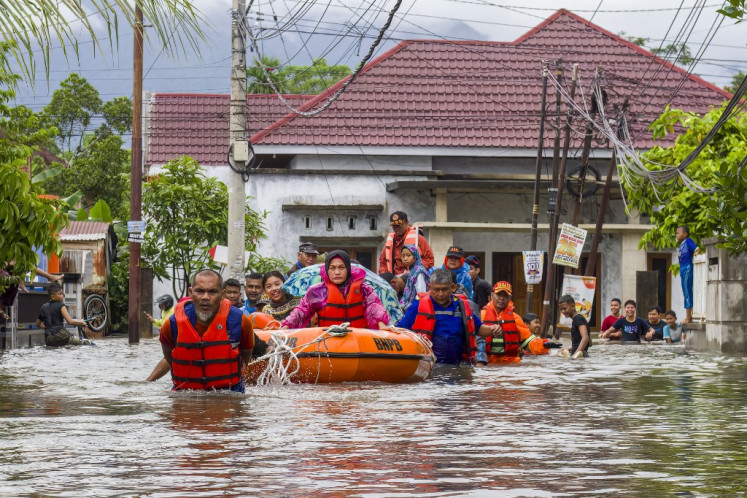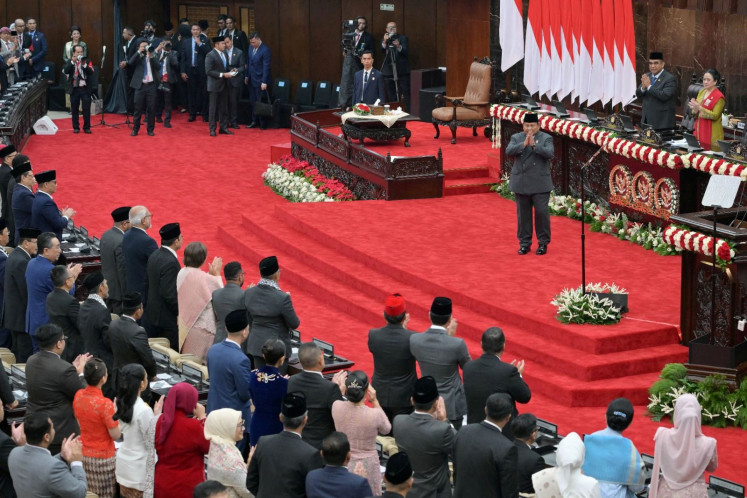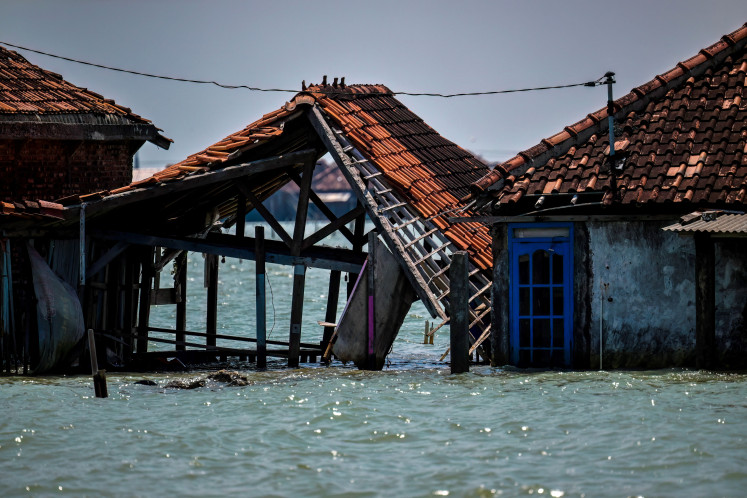Popular Reads
Top Results
Can't find what you're looking for?
View all search resultsPopular Reads
Top Results
Can't find what you're looking for?
View all search resultsIndonesia's new patent law: A challenge to prosperity
But Indonesia’s patent bill, passed on July 28, has alarmed investors by downgrading the country’s international property system well below international standards.Taken together, these patent bill provisions send a hostile message to foreign investors and risk undermining Indonesia’s economic ambition.
Change text size
Gift Premium Articles
to Anyone
T
he reappointment of internationally respected Sri Mulyani Indrawati as finance minister shows that President Joko “Jokowi” Widodo is serious about economic reform.
Top of the former World Bank official’s in tray is fiscal stability. Longer term, she will target new sources of economic growth to counter the country’s reliance on natural resources and avoid the looming middle-income trap.
Economists generally agree that sustainable economic growth depends on higher value services, manufacturing, research and development (R&D), and less reliance on commodities and natural resources.
Indonesia’s domestic manufacturing sector is basic, focused on the low-value assembly of products designed and manufactured elsewhere. It generates low-quality jobs and little economic value or tax revenue.
China has amply shown that economic growth cannot be sustained by low-wage, low-skilled manufacturing.
For Indonesia to join the ranks of high-income countries in the longer term it needs to start building a knowledge economy.
These industries – such as biopharmaceuticals, information technology, chemicals and entertainment – underpin sustainable growth and employment in the economies of high-income countries.
Take the United States. In 1975, 83 percent of the market value of its 500 biggest companies comprised “tangible” products and services, in areas such as manufacturing, agriculture and commodities. Much like Indonesia today.
Today, the reverse is true. By 2015, 85 percent of the value of these companies came from “intangible assets”. Simply put, the most successful US companies make almost all their money through ideas, concepts, brands and innovative products and processes.
Advanced Asian economies – Japan, South Korea, Singapore and Taiwan – have taken this path, moving over recent decades from agriculture to manufacturing to knowledge-based industries.
The Indonesian government and Asian Development Bank (ADB) recognize that the knowledge economy is vital for Indonesia’s future growth. “Building up knowledge-oriented sectors and processes is crucial for continued high growth and strengthening Indonesia’s position in ASEAN,” said Bindu N. Lohani, ADB’s vice president for knowledge management and sustainable development.
The government’s early steps to stimulate this activity include pledging to reduce red tape and improve the business climate. Education and ICT infrastructure must improve too, it has said.
Few countries have developed thriving knowledge-based industries purely from domestic resources. Scientific knowledge, technological know-how and the required R&D capital are dispersed globally.
Gone are the days when one R&D company, for example industrial giant General Electric or tech behemoth Samsung, created products in-house from start to finish.
Today, multinational companies collaborate with small companies, academia and the public sector at all stages of the R&D cycle, often across borders.
Indonesia’s challenge is to become a meaningful participant in this new world of networked innovation. It must attract innovative multinational companies to its shores, bringing with them the capital, skills and technological know-how that Indonesia may be missing.
The potential prize is enormous: China now captures more foreign direct investment in R&D than the US. The pharmaceuticals sector leads the way with investments totaling $1.6 billion between 2010 and 2015, according to FDI Markets.
Above all, foreign investors need certainty over their intellectual property rights, including clearly defined and easily enforceable patent rights. If this protection is weak, companies will be unlikely to invest or enter into local partnerships. They will not launch innovative new products for fear of having their rights compromised.
Indonesia has intellectual property basics in place, in line with its World Trade Organization commitments. These include making available patent terms of 20 years for all inventions. It has also shown the political will to fight piracy and other international property rights violations.
But Indonesia’s patent bill, passed on July 28, has alarmed investors by downgrading the country’s international property system well below international standards.
Medicine innovators are particularly concerned about the ease with which the government can now override patents with a compulsory license, and new rules that forbid patents for new uses of existing medicines.
Other high-tech industries worry about new “localization” rules that would force them to transfer proprietary technologies to local companies.
Taken together, these patent bill provisions send a hostile message to foreign investors and risk undermining Indonesia’s economic ambition.
Many Asian countries have already seized opportunities presented by the globalization of innovation, which drives increasing proportions of their economic growth. To set itself on the path to prosperity and join the ranks of high-income countries, Indonesia must also open itself to innovation, in particular by offering a warmer welcome to innovative private sector companies.
***
Philip Stevens is director of Geneva Network (geneva-network.com), a UK-based research organization focusing on trade and development issues. He has also worked for the World Intellectual Property Organization (WIPO) in Geneva, where he worked in its global challenges division on a range of IP and health issues, as well as coordinating the agency’s cooperation with the World Health Organization and World Trade Organization in these policy areas. Philip is also a fellow of the Southeast Asia Network for Development (SEANET).
---------------
We are looking for information, opinions, and in-depth analysis from experts or scholars in a variety of fields. We choose articles based on facts or opinions about general news, as well as quality analysis and commentary about Indonesia or international events. Send your piece to community@jakpost.com. For more information click here.










